Key takeaways:
- Understanding participant motivation involves recognizing the psychological triggers that drive engagement, such as emotional connections and the desire for practical applications.
- Customer experience is vital for brand loyalty, as positive interactions can transform perceptions and encourage repeat business.
- Engagement can be enhanced through interactive elements, compelling narratives, and personalized content that resonate with participants’ interests.
- Post-event follow-up and inclusive practices are essential for maintaining connections and accommodating diverse learning styles, fostering a richer experience.
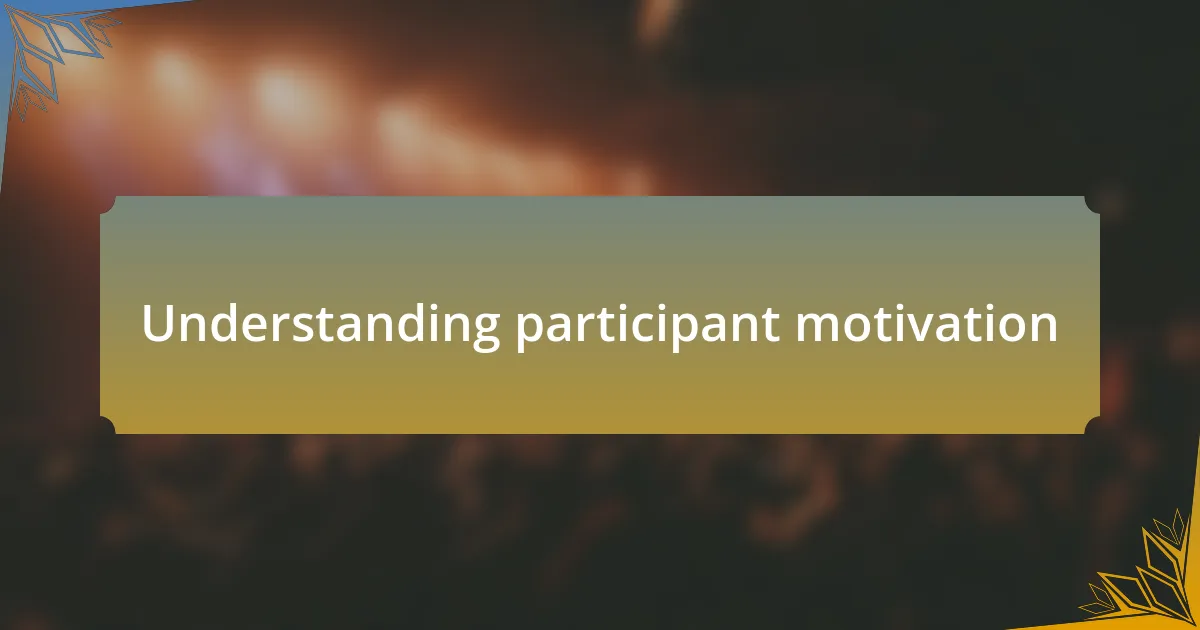
Understanding participant motivation
Understanding participant motivation requires delving into the unique psychological triggers that drive individuals to engage. For instance, I recall attending a conference where I found myself drawn to sessions that promised not just knowledge but also practical application—a reminder that people seek value that transforms their experience into actionable insights. Isn’t it fascinating how the promise of learning something useful can overshadow the allure of flashy presentations?
On another occasion, I noticed a sharp contrast in engagement when the speaker began to share personal stories rather than just statistics. This shift transformed the room’s atmosphere, reminding me that emotional connections often fuel motivation. Have you experienced a moment like that? It highlights the point that motivation isn’t just about content; it’s about making participants feel personally invested in the experience.
Finally, I’ve learned that understanding the motivators behind participation can lead to more successful outcomes. Participants often seek community, validation, and networking opportunities. Reflecting on my own experiences, I’ve realized that many of us attend events not just to learn but to connect with like-minded individuals—creating a shared sense of purpose. This realization prompts an important question: What will you do to foster that sense of community at your next event?

Importance of customer experience
The significance of customer experience cannot be overstated—it shapes perceptions and drives loyalty. I remember a time when an unexpected gesture from a brand instantly changed my outlook. They reached out to resolve an issue I didn’t even think was a big deal, showing me that they genuinely cared about my satisfaction. Can you recall a similar encounter that transformed your impression of a company?
When customers feel valued, they are more inclined to become repeat buyers. It’s not just about resolving complaints; it’s about creating an environment where every interaction leaves a positive impression. I’ve seen firsthand how companies that prioritize customer experience tend to flourish, often turning casual visitors into passionate advocates. After all, what could be more rewarding than knowing you played a part in someone’s positive experience?
Moreover, customer experience directly impacts brand reputation and referrals. I once shared an excellent experience with a friend, encouraging them to try a service I had enjoyed. My enthusiasm stemmed from how well I was treated. This ripple effect showcases how one positive experience can lead to others, reinforcing the idea that satisfied customers are the best marketing tools. Wouldn’t you agree that a single encounter can create a cascade of goodwill?
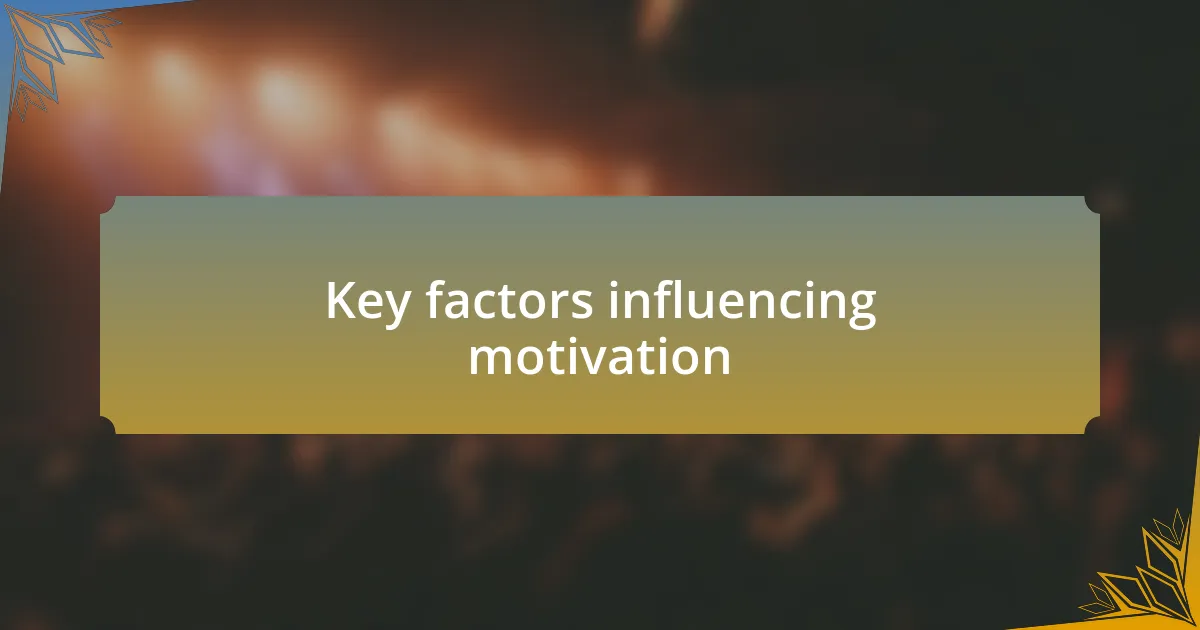
Key factors influencing motivation
One of the primary factors influencing motivation is the sense of belonging. I vividly recall attending a workshop where the facilitator created a space that felt inclusive and welcoming. That sense of connection not only made me more engaged but also motivated me to contribute ideas—because I felt like I was part of something bigger. Have you ever experienced a situation that ignited a similar feeling in you?
Another key factor is the alignment of personal values with the goals of a project or event. When I participated in a community initiative that aligned with my passion for environmental sustainability, I felt a surge of motivation. It was as though my personal beliefs fueled my involvement, pushing me to give my best effort. Does aligning your values with what you participate in spark a drive within you, too?
Lastly, recognition and feedback significantly boost motivation. I once took part in a team project where our efforts were acknowledged in a public forum. This recognition validated our hard work and instilled a sense of accomplishment. Have you had moments where a simple acknowledgment made all the difference in your enthusiasm to engage?
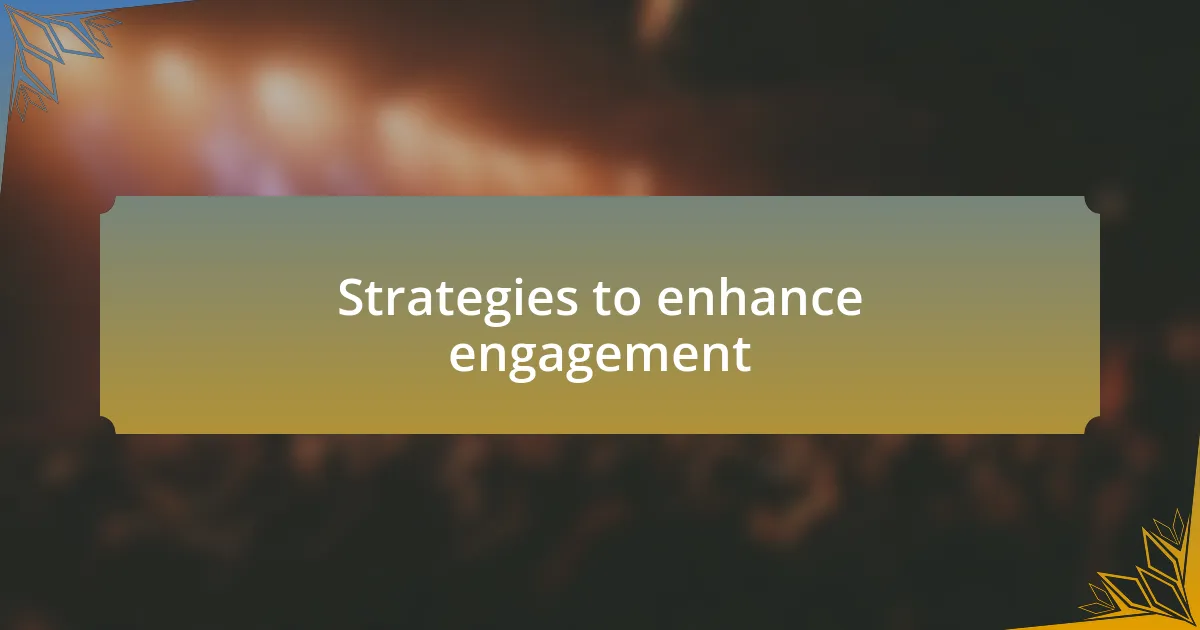
Strategies to enhance engagement
One effective strategy to enhance engagement is by incorporating interactive elements such as polls or live Q&As. I remember attending a session where the speakers actively solicited questions from the audience during their presentation. The atmosphere transformed into a dynamic conversation, and I found myself more invested, eager to share my thoughts and hear others’. Have you ever felt that rush when your voice is not only heard but valued in a discussion?
Another approach involves crafting compelling narratives around the topics presented. For instance, I participated in a conference where stories of real-life challenges captivated the audience. These narratives created a memorable connection with the subject matter and made the entire experience feel relevant and impactful. Have you noticed how a good story can draw you in and keep you engaged?
Finally, leveraging technology to personalize experiences can significantly boost engagement. At one event I attended, participants received tailored content based on their interests before the conference started. This attention to individual preferences made me feel recognized, fostering a deeper commitment to the event. How often do you find yourself more engaged when the content resonates with your personal interests?
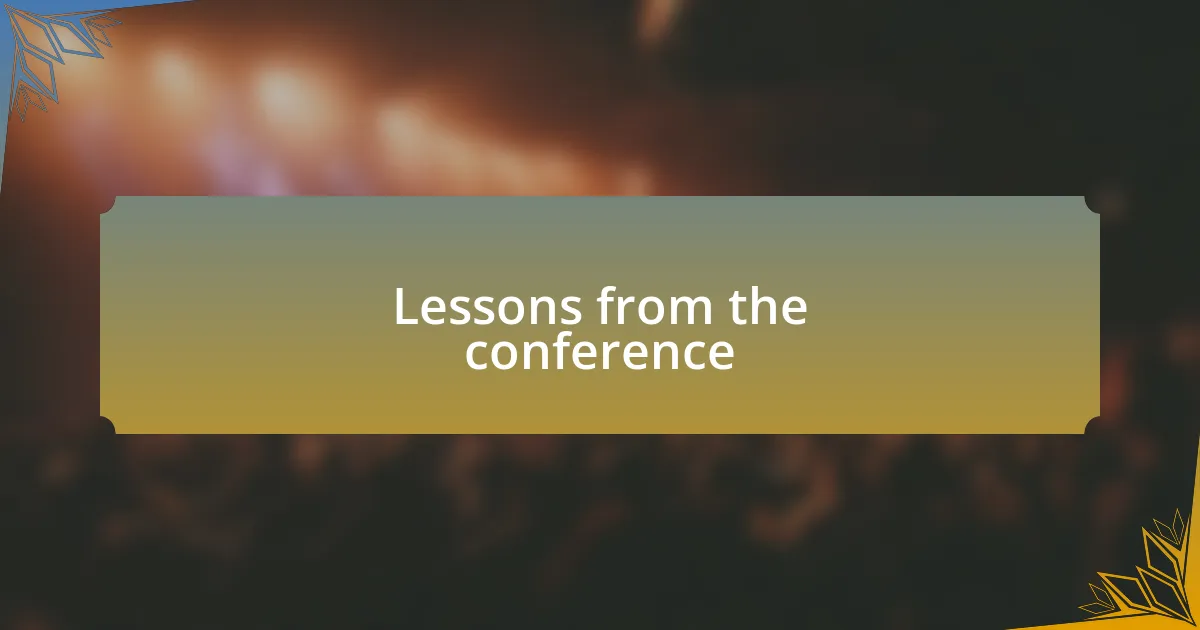
Lessons from the conference
During the conference, I learned that recognizing participants’ diverse motivations is crucial. I attended a workshop where speakers discussed how understanding what drives each individual—be it networking, skill acquisition, or simply curiosity—can shape the conference experience. Have you ever noticed how connecting with others who share your objectives enhances your overall satisfaction?
Another valuable lesson was the importance of follow-up after the conference. One session emphasized how post-event engagement, like personalized emails or resource sharing, can maintain momentum and solidify connections made during the event. I recall receiving a thoughtful summary of key takeaways—and it made me feel that my participation was genuinely valued. Don’t you agree that a little recognition can go a long way in fostering lasting relationships?
Lastly, I was struck by the power of inclusive practices. A discussion on accommodating different learning styles really resonated with me. The speakers highlighted how varying presentation modes—like visual aids or hands-on activities—can ensure that everyone feels included. Have you ever struggled to engage with material that didn’t align with your preferred learning style? It made me reflect on the responsibility we have to create spaces where diverse voices and perspectives are embraced.
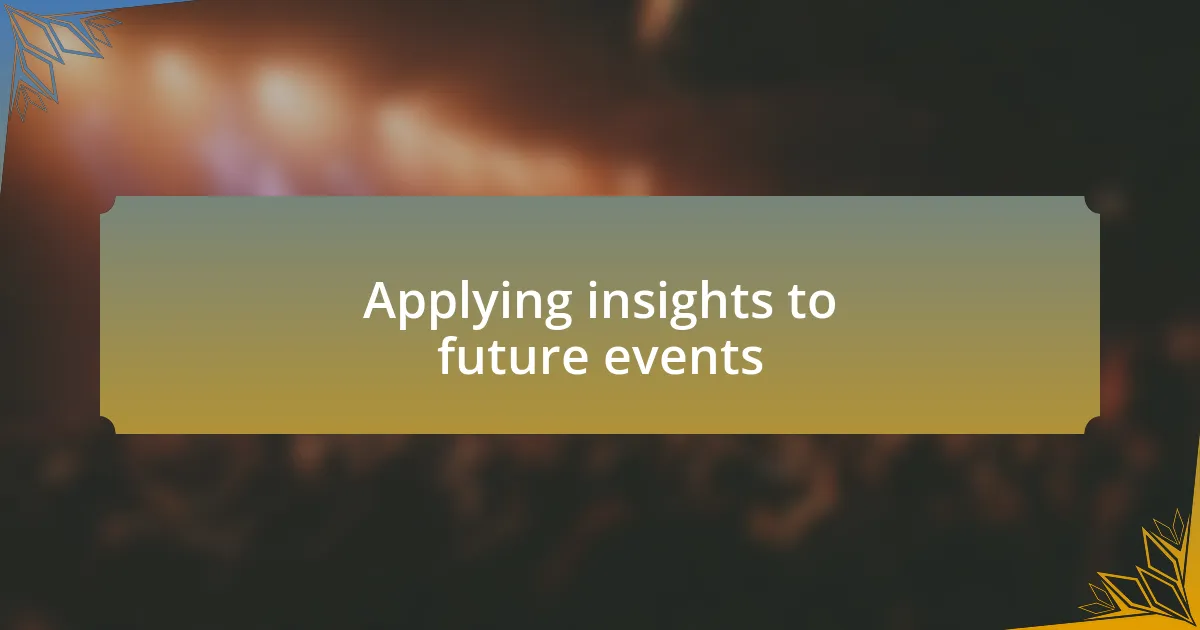
Applying insights to future events
When considering future events, it’s essential to apply the insights gained about participant motivation. I’ve seen firsthand how tailoring content to address specific interests can drastically change the atmosphere. For instance, at a past conference, I noticed that a session focusing on practical applications of theories drew a much more engaged audience. Wouldn’t it be wonderful to create spaces where attendees feel they are learning exactly what they need?
Engagement doesn’t stop at the event’s conclusion; it’s critical to carry that momentum forward. One memorable experience for me was when a speaker followed up with tailored resources, guiding us to continue our learning journey. This made me feel that the organizers genuinely cared about our growth. How different would our experiences be if every event made follow-ups a priority?
Additionally, embracing diverse learning styles is a game-changer for future engagements. In one session, I observed how the use of interactive elements made the information more accessible, sparking lively discussions among participants. Doesn’t it just make sense that when we cater to various ways of learning, we foster a richer, more collaborative environment? Prioritizing inclusivity in every aspect of event planning is not just beneficial; it’s essential for enhancing participant experiences.
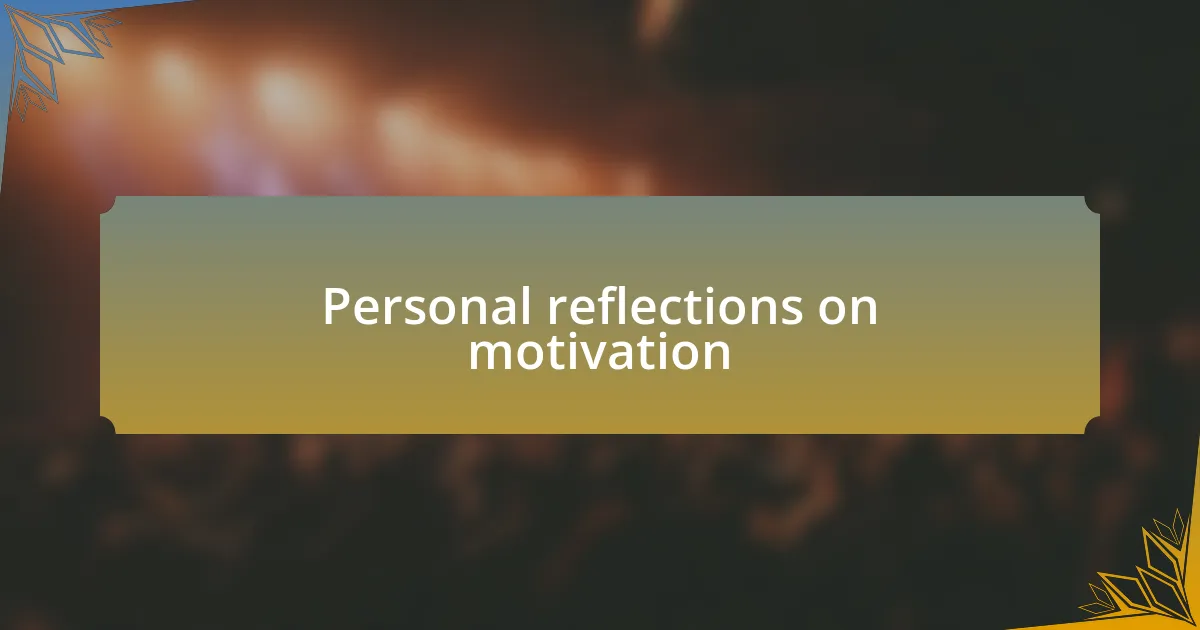
Personal reflections on motivation
Reflecting on motivation, I often think about how personal connections drive engagement. At a recent workshop, I witnessed a participant light up when they shared a story that resonated with the topic. It was a powerful reminder that when we share our experiences, we create bonds that make learning meaningful. Don’t you find that personal stories often hold more weight than facts?
I’ve also grappled with my own motivation at events. I remember feeling instantly more engaged when a facilitator took the time to acknowledge our diverse backgrounds and perspectives. That small gesture made me believe that what I had to contribute mattered. How often do we see this in event settings? The truth is, fostering an environment where everyone feels valued is crucial to motivating participants.
Sometimes, it’s the unexpected moments that ignite passion. I recall a moment from a conference where a spontaneous brainstorming session turned into an inspiring idea exchange. That energy was contagious! It made me realize that motivation thrives in dynamic environments where creativity is celebrated. Isn’t it fascinating how a little spontaneity can transform the entire experience?